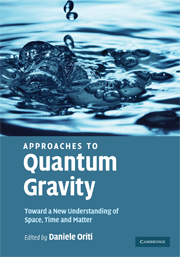Book contents
- Frontmatter
- Contents
- List of contributors
- Preface
- Part I Fundamental ideas and general formalisms
- Part II String/M-theory
- Part III Loop quantum gravity and spin foam models
- Part IV Discrete Quantum Gravity
- Part V Effective models and Quantum Gravity phenomenology
- 22 Quantum Gravity phenomenology
- 23 Quantum Gravity and precision tests
- 24 Algebraic approach to Quantum Gravity II: noncommutative spacetime
- 25 Doubly special relativity
- 26 From quantum reference frames to deformed special relativity
- 27 Lorentz invariance violation and its role in Quantum Gravity phenomenology
- 28 Generic predictions of quantum theories of gravity
- Questions and answers
- Index
27 - Lorentz invariance violation and its role in Quantum Gravity phenomenology
from Part V - Effective models and Quantum Gravity phenomenology
Published online by Cambridge University Press: 26 October 2009
- Frontmatter
- Contents
- List of contributors
- Preface
- Part I Fundamental ideas and general formalisms
- Part II String/M-theory
- Part III Loop quantum gravity and spin foam models
- Part IV Discrete Quantum Gravity
- Part V Effective models and Quantum Gravity phenomenology
- 22 Quantum Gravity phenomenology
- 23 Quantum Gravity and precision tests
- 24 Algebraic approach to Quantum Gravity II: noncommutative spacetime
- 25 Doubly special relativity
- 26 From quantum reference frames to deformed special relativity
- 27 Lorentz invariance violation and its role in Quantum Gravity phenomenology
- 28 Generic predictions of quantum theories of gravity
- Questions and answers
- Index
Summary
Introduction
Although there is enormous uncertainty about the nature of Quantum Gravity (QG), one thing is quite certain: the commonly used ideas of space and time should break down at or before the Planck length is reached. For example, elementary scattering processes with a Planck-sized center-of-mass energy create large enough quantum fluctuations in the gravitational field that space-time can no longer be treated as a classical continuum. It is then natural to question the exactness of the Lorentz invariance (LI) that is pervasive in all more macroscopic theories. Exact LI requires that an object can be arbitrarily boosted. Since the corresponding Lorentz contractions involve arbitrarily small distances, there is an obvious tension with the expected breakdown of classical space-time at the Planck length. Indeed, quite general arguments are made that lead to violations of LI within the two most popular approaches towards QG: string theory and loop quantum gravity
This has given added impetus to the established line of research dedicated to the investigation of ways in which fundamental symmetries, like LI or CPT, could be broken. It was realized that extremely precise tests could be made with a sensitivity appropriate to certain order of magnitude estimates of violations of LI.
- Type
- Chapter
- Information
- Approaches to Quantum GravityToward a New Understanding of Space, Time and Matter, pp. 528 - 547Publisher: Cambridge University PressPrint publication year: 2009
- 7
- Cited by



